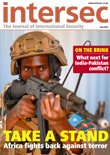Oil and turmoil in Libya
As violence and instability continue to spread in Libya, Matthew Hedges asks whether the Libyan people will be forced to choose between political freedom and security to protect the country’s hydrocarbon lifeblood
The past twelve months have highlighted the critical lack of legitimacy of power in Libya. High-profile examples of the palsy writ of the government, such as the audacious kidnappings of the then-serving Prime Minister Ali Zeidan and later the Jordanian Ambassador to Libya, might actually pale in comparison to the challenge to the unity of the Libyan state by the rise of Major-General Khalifa Haftar. The army’s former chief of staff, and one-time Gaddafi ally, is threatening to overthrow the current regime with the National Libyan Army. Though his actions cast him as a direct opponent of centralised power in Tripoli, a number of high-level defections – among them former Prime Minister Zeidan and the Libyan Air Defence Commander – have given Haftar, and the Libyan National Army he commands, a veneer of legitimacy.
The General National Congress (GNC), which has been invested with official political power in Libya since it replaced, following elections, the National Transitional Council (NTC) in August 2012, struggles to assert its authority. A great part of the problem is that the GNC is seen as being dominated by Islamist-backed political blocks. Rather than acting as a binding agent, the GNC has served to polarise the Libyan population. At the time of writing, Libya has two would-be prime ministers, each with a competing claim – Abdullah Al-Thinni and Ahmed Maiteeq. Al-Thinni has refused to stand down, arguing that the Ministry of Justice’s Legal Department has declared the Maiteeq election as illegal.
The use and abuse of Congress is tied up tightly when it comes to the question of political legitimacy in Libya. General Haftar, for example, has declared his intention to destroy what he calls the Islamists that back the GNC.
Libyans are divided by town, tribe and their degree of religious fervour. Yet, when it comes to the future of the country, there is a noticeable hardening between Islamists and those who favour strong military rule to restore order. In this sense, then, many Libyans are looking to what has unfolded in Egypt for the right or wrong lessons, depending on their respective viewpoints. As in Egypt, the overthrow of a long-time dictator in Libya brought to the surface a number of religious groups and movements that coveted political power to advance their agendas. Groups such as Ansar al-Sharia, which has been described as a satellite al-Qaeda organisation, present a serious threat to the security scene.
In the east of the country, where armed Islamist groups are strongest, assassinations are commonplace. Lawlessness in Libya has allowed international terrorist organisations to flourish; they are, and have been, using the lack of control in Libya to prepare for operations inside and outside the country. The In Amenas attack in neighbouring Algeria is the most explicit example of the threat posed to the international interest from such groups. What is remarkable is that many Islamist-inspired militias have been incorporated into the official government organs, especially the Ministry of Interior.
In order to rid the country from these armed groups, Major General Khalifa Haftar and his associates launched Operation Dignity. While his tactics have been somewhat controversial within Libyan society – almost 100 people were killed in May in Benghazi in the ensuing fighting – his aim has growing support among a population tired of an absence of law and order. Indeed, Operation Dignity’s widespread support has caused many within the official military apparatus of the government to defect to Haftar’s side. Additionally, it is the significance of militia defection to Haftar’s ideology that is greatest concern for the GNC, as units such as the Libyan Shield Force have remained neutral.
The use of arms by non-government elements – both pro-Haftar and religiously motivated groups – is a clear indication of the collapsing security situation in Libya. The inability of the GNC to manage a security apparatus strong enough to lead the country through its troubles enables such groups to survive, as there is a clear mandate to bear arms. Unwillingness to combat extremist groups further reinforces the international community’s concerns over developments in the country. The GNC’s failure to stop rebels in the east of the country from loading oil onto the North Korean-flagged tanker the Morning Glory was an embarrassment from which the government never really recovered. While Prime Minister Zeidan ultimately paid the price for the incident, there is nothing that would stop a similar event from happening again.
The ability of Haftar to employ advanced ground and air weapons signifies not only his power and authority, but also the inability of anyone, except perhaps forces under the control of the city of Misrata, to counter any move he makes along coastal Libya. If a military-orientated, secular-leaning group were to take power, it is likely that Islamist groups continue their struggle through insurgency tactics, keeping the tempo of violence in the country at a steady beat. Moreover, the prospect of hundreds, if not eventually thousands, of Libyans returning home having fought in the anti-Assad campaign in Syria poses a looming spectre on the horizon. While the effects of this eventual repatriation of radicalised and experienced fighters cannot be gauged, it will only add a further destabilizing ingredient into the already over-spiced Libyan pot.
The lifeblood of Libya’s future is hydrocarbon revenues. The inability of the Libyan government to extend its writ across much of the country is adding to the nervousness of foreign companies operating in Libya, giving those that may be considering entering Libya pause for thought. A full-blown breakdown of business confidence in the oil sector would be disastrous for a country where hydrocarbon production accounts for an estimated 90 per cent of government revenues.
The Petroleum Forces Guard (PFG) was from its inception a farce. Sitting nominally under the Ministry of Defense (see diagram below), the creation of the PFG has given institutional legitimacy – not to mention government salaries – to armed factions whose agendas often run counter to that of the government.
In a country with a critical lack of authority and power, the centralised state created an entity to protect its critical infrastructure assets, obliging foreign firms to rely on PFG elements for security. Indeed, as a response to the In Amenas attack in neighboring Algeria in January 2013, the Libyan government enlarged this unit with anti-Gaddafi elements, unknowingly strengthening their future opponents. Militia leader, and commander of the PFG for the central sector, Ibrahim Jathran, split off and created the Cyrenaica Self-Defense Force in direct opposition to Tripoli’s rule. Demanding more authority for the Eastern region, historically known as Cyrenaica, Jathran’s moves are a further indication of the institutional weakness of the Tripoli government to consolidate power.
A greater proportion of what remains of Libya’s oil revenues must be put towards creating a centralised security apparatus, one that transcends regional and tribal differences. This should be a priority for those members of the international community concerned with the wider implications of a failed Libyan state. The nexus of Libya’s porous borders, the presence of ideologically driven fighters and the proliferation of weapons after Gaddafi’s armouries were ransacked has already proliferated across the Sahel region and North Africa more broadly. But matters could get worse. Libya’s current focus in Security Sector Reform on border security is understandable considering the In Amenas attack and the pervasive cross-border criminal smuggling networks. In this field, Libya has received support from, among others, the European Union (EU), reflected in the Brussels’ Border Assistance Mission in Libya.
To be sure, efforts in security sector reform (SSR) have been hampered by deep fractures in Libyan society that have been exposed since the Gaddafi regime fell. But countries with diverse ethnographic populations have been able to forge national institutions elsewhere. Lebanon, which is a patchwork of ethnic and religious groups, has created a non-aligned security entity – the Lebanese Armed Forces (LAF) – that is widely accredited with preventing greater violence occurring between the countries myriad factions.
The current practice of allowing brigades organised around town, clan or religious fervency to take on the security functions will in the long run be deeply damaging. It is in this field that the international community can make a lasting impact on the Libyan scene. A number of states are in fact currently assisting Libya but this succour requires greater co-ordination if it is to have a lasting effect. International assistance in training Libyan security personnel is episodic – that is, it is based on series of individual country-to-country agreements without an overarching strategy behind it. Nato, with its long experience in capacity building in transitional states, might be just the international organisation to provide an integrated plan.
There is a good chance that General Haftar will intensify his military campaign against armed Islamist groups in the lead up to any election. How far outside powers with an interest in Libya’s fate will support Haftar – or oppose him, in the case of say Qatar – remains an interesting variable to monitor. This scenario does, however, present a conundrum. Is the priority for the Libyan people democracy or security? Many Egyptians have answered recently that the former has more value. This zero-sum calculation, however, runs counter to Benjamin Franklin’s famous dictum that: “Those who would give up essential liberty, to purchase a little temporary safety, deserve neither liberty nor safety”. Mirroring events in neighbouring Egypt, Haftar will attempt to rid Libya of the Islamist government and run for office through the ballot box. Where there is widespread support for Operation Dignity, there is not the same affection for General Haftar given his background in the Gaddafi regime and subsequently his relationship with the United States.
Haftar and the anti-Islamist parties will continue grow in stature given the inability of the Islamist groups to consolidate power in Libya. A key question remains: will he be able to consolidate the militias and factions in opposition to the Islamists through the democratic process? What is certain is the future of Libya remains hanging in the balance. The country has a difficult journey ahead, with little sign that it will come any were close to justifying that triumphalism and optimism that followed the toppling of the Gaddafi regime.
Matthew Hedges has been an Analyst and Project Manager at the Institute for Near East and Gulf Military Analysis (INEGMA) since June 2009. He holds a Masters Degree in Middle Eastern Politics. His key research areas are civil-military relations, defense trade and anthropological analysis of the GCC.









